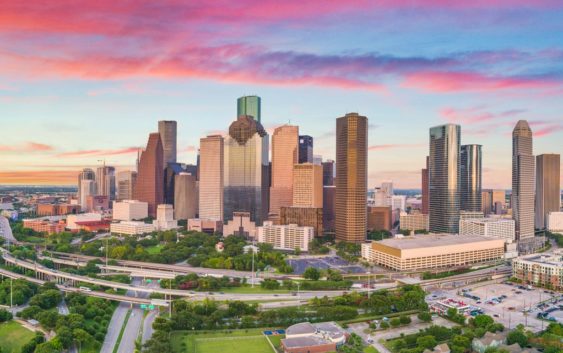- A year after Texas’ largest wildfire, Panhandle residents tugged between hope and anxiety
- Another $500M for Hurricane Helene relief in North Carolina passes key hurdle
- Crews battle wildfire in McDowell County, NC
- Wildfire in McDowell County, NC is 20% contained, officials say
- California governor asks Congress for nearly $40 billion for Los Angeles wildfire relief
Crime, flooding, and street conditions remain top priorities for Houston voters, survey says

UH released the results of a survey of voters regarding their preferences and opinions heading into the municipal election on Nov. 7.
HOUSTON — As Houston looks to decide on a new mayor come November, crime, flooding, and street conditions remain the top priorities for voters, according to a new survey from the University of Houston.
The Hobby School of Public Affairs at UH released Tuesday morning the findings of a survey of voters regarding their preferences and opinions heading into the municipal election on Nov. 7.
Voters are closely divided over whether the city is heading in the right or wrong direction, 47% to 53%, according to the survey.
The survey was conducted between July 12 and July 20 by contacting likely voters via text messages which directed them to complete an online survey.
“As voters prepare to choose a new mayor, they are thinking about basic city services, from concerns about violent crime and property crime to the condition of their neighborhood streets,” Renee Cross, senior executive director of the Hobby School, said.
Voters were asked about what policies should be prioritized for the incoming mayor: identifying a top priority, important but a lower priority, not too important, and should not be addressed.
Here is a breakdown of the results of the survey:
- 83% believe that crime should be a top priority.
- 72% believe that flooding should be a top priority.
- 65% believe that road and street conditions should be a top priority.
- 65% believe that the economy and jobs should be a top priority. 44% believe that affordable housing should be a top priority.
- 34% believe that trash collection and recycling should be a top priority. 16% believe that parks and recreation should be a top priority.
- 12% believe that animal adoption and control should be a top priority.
- Blacks (91%) are more likely than whites (77%) to list crime as a top priority.
- Black Democrats (91%) and Latino Democrats (79%) are more likely than white Democrats (59%) to list crime as a top priority, while there is little difference between white (98%) and Latino (95%) Republicans and Black Democrats (91%).
- Blacks (72%) are significantly more likely than whites (36%) and Latinos (35%) to list affordable housing as a top priority.
- Blacks are also significantly more likely than whites and Latinos to consider extremely or very important to the next mayor’s housing agenda policies such as providing residents with funding to pay their rent or mortgage (70% vs. 36% and 36%), requiring developers to build more affordable housing units (74% vs. 42% and 42%), and increasing the number of homeless shelters and temporary housing units (69% vs. 43% and 46%).
Voters were also asked about the impact of issues on the quality of life in their neighborhood, saying whether a particular issue has a major negative impact (as opposed to a minor negative impact, no negative impact or don’t know) on the quality of life in their neighborhood.
- 50% said roads and streets in bad condition have a major negative impact.
- 48% said violent crime has a major negative impact.
- 45% said home and car break-ins have a major negative impact.
- 39% said illegal drug sales and use have a major negative impact.
- 39% said the homeless population has a major negative impact. 28% said illegal dumping has a major negative impact.
- 27% said lack of sidewalks or poor-quality sidewalks have a major negative impact.
- 26% said poor air quality has a major negative impact.
- 21% said a lack of street lighting has a major negative impact.
- 17% said no major grocery store within 1 mile has a major negative impact.
- Latinos (68%) and Blacks (61%) are more likely than whites (34%) to say violent crime has a major negative impact.
- Latinos (62%) and Blacks (50%) are more likely than whites (35%) to say home and car break-ins have a major negative impact.
- Latinos (53%) and Blacks (52%) are more likely than whites (29%) to say illegal drug sales and use have a major negative impact.
- Latinos (46%) and Blacks (45%) are more likely than whites (16%) to say illegal dumping has a major negative impact.
- Latinos (54%) and Blacks (48%) are more likely than whites (30%) to say the homeless population has a major negative impact.
- Latinos (63%) and Blacks (56%) are more likely than whites (41%) to say that roads and streets in bad condition have a major negative impact.
UH said the survey population of 800 has a margin of error of =/- 3.5 %.
Read the full report below: